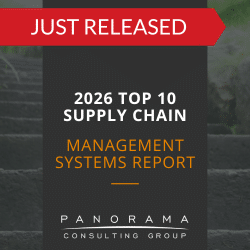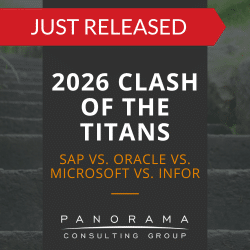Key Takeaways:
- AI-driven procurement often involves agents with algorithm-driven preferences that must be governed to ensure business alignment.
- ERP systems play a critical role in supporting AI-driven buying behavior by feeding clean, machine-readable data to downstream systems, like product information management systems (PIMs).
- AI agents in procurement operate within ERP and third-party systems to automate purchasing and optimize cost-performance tradeoffs.
- Brands may be excluded from consideration if their ERP data fails to meet the requirements of AI agents evaluating products and services across digital ecosystems.
While it’s clear that AI is reshaping business strategies, you may not be aware of all the ways it’s influencing decisions across both the customer journey and the supply chain.
When it comes to brand and vendor decisions, AI technologies (more specifically, AI agents) are creating new opportunities and challenges that leaders can’t ignore.
Today, we’re exploring the intersection of AI agents and “brand preferences”. The algorithmic, data-driven, and invisible preferences of AI agents are influencing buying decisions from multiple angles: externally with your consumers and internally within your own procurement functions.
Does your ERP strategy account for evolving AI-driven procurement and AI-driven buying behavior? Keep reading to discover what’s influencing AI agent preferences, so you can transform your internal purchasing and external marketing.
What We Mean by “AI Agents”
Today’s AI agents are defined by autonomy, goal orientation, and action. Agents function independently: gathering data, filtering options, applying preferences, and surfacing outcomes—all in one flow.
An AI agent in procurement, for example, might:
- Evaluate multiple vendors based on performance and cost data
- Initiate purchase requests within policy thresholds
- Flag contract inconsistencies or recommend alternative suppliers
- Execute repeatable purchasing tasks without human input
These use cases are already being deployed across enterprise procurement, logistics, and finance.
Like any other buyer, AI agents develop preferences—sometimes subtly, sometimes through explicit logic embedded in their design. That’s where your ERP strategy comes in.
The 2026 Top 10 ERP Systems Report
What vendors are you considering for your ERP implementation? This list is a helpful starting point.
Internal AI Agents Are Reshaping Enterprise Buying
AI agents in procurement already operate in many organizations as embedded copilots or full-task automators. Whether built into ERP platforms or deployed through third-party solutions, these agents are optimizing decisions in ways human buyers never could.
However, optimization isn’t neutral. Over time, AI-driven procurement agents may favor vendors with cleaner data, better integration records, and fewer exceptions. They may begin to “prefer” brands that minimize system friction—even if no one explicitly told them to.
For example, a food company using a manufacturing ERP system to automate raw material purchasing might see its AI agent repeatedly favor suppliers with consistent packaging specs and fewer delivery delays—even if their per-unit costs are slightly higher.
Strategic Implications for ERP Implementations
- Vendor Performance Visibility: AI agents rely on structured, real-time data. If your ERP platform doesn’t surface vendor performance at the transaction level, those vendors may be algorithmically deprioritized—even if they’re strategically important elsewhere.
- Decision Traceability: AI procurement agents require guardrails. Executives must ensure that ERP systems capture and explain agent decisions to maintain compliance and organizational trust. (Our generative AI consultants can assist with defining governance frameworks and aligning AI behavior with business rules.)
- Policy Embeddedness: Your ERP system needs to encode not just rules, but preferences—ideally preferences that you specify. For example, should local sourcing be prioritized in certain categories? Should ESG scores be considered?
External AI Agents Are Acting as Buyers
Procurement isn’t the only domain being transformed. On the customer side, AI agents are beginning to assist (and in some cases replace) your own customers.
For example, a customer might ask ChatGPT, “Find me a well-reviewed air purifier under $200, and show me options that can arrive within three days.”
Behind the scenes, GPT-4o uses activated plugins to search across retail sites, filter by user constraints, and generate a shortlist with product links and delivery times.
If your brand lacks structured metadata (e.g., shipping windows, real-time pricing, or review scores), the agent may exclude it from the results entirely.
In cases like these, your business isn’t selling to a person. It’s selling to an AI agent operating on someone else’s behalf.
That means your ERP system is no longer just an internal operations engine—it must feed your broader visibility platform. While AI agents are more likely to interact with PIMs, APIs, and marketplaces, those systems often rely on ERP as their source of truth for data like pricing and inventory availability. If your data is incomplete, outdated, or misaligned, your business may get filtered out of buying workflows.
Strategic Implications for ERP Implementations
- Data Accessibility: Is your product, pricing, and inventory data structured and exposed—either directly or through connected systems—in a way that external AI agents can consume?
- Operational Transparency: Does your ERP system feed downstream systems with the kind of data AI agents rely on to evaluate vendors—such as delivery times, fulfillment accuracy, or service level history?
- AI Visibility Monitoring: Is your organization actively monitoring how its brand appears in systems that external AI agents interact with, and ensuring ERP-fed data supports that visibility?
Executives who answer “no” to these questions should revisit whether their ERP strategy reflects the new reality of AI buying behavior. Our ERP selection consultants always advise clients to validate ERP selection criteria and system design against future-state use cases—including AI-driven procurement, external data visibility, and partner system interoperability.
Does Your ERP Strategy Support AI-Driven Purchasing?
The use of AI agents in the purchasing process and the customer journey introduces a new kind of stakeholder—one that bases choices on algorithms, learned patterns, and operational efficiency rather than brand familiarity and relationship history.
Ready to reassess your ERP strategy in the face of evolving AI agents? Our independent ERP consultants are here to help. Contact us for clarity, guidance, and strategic insight into ERP selection and digital transformation.













